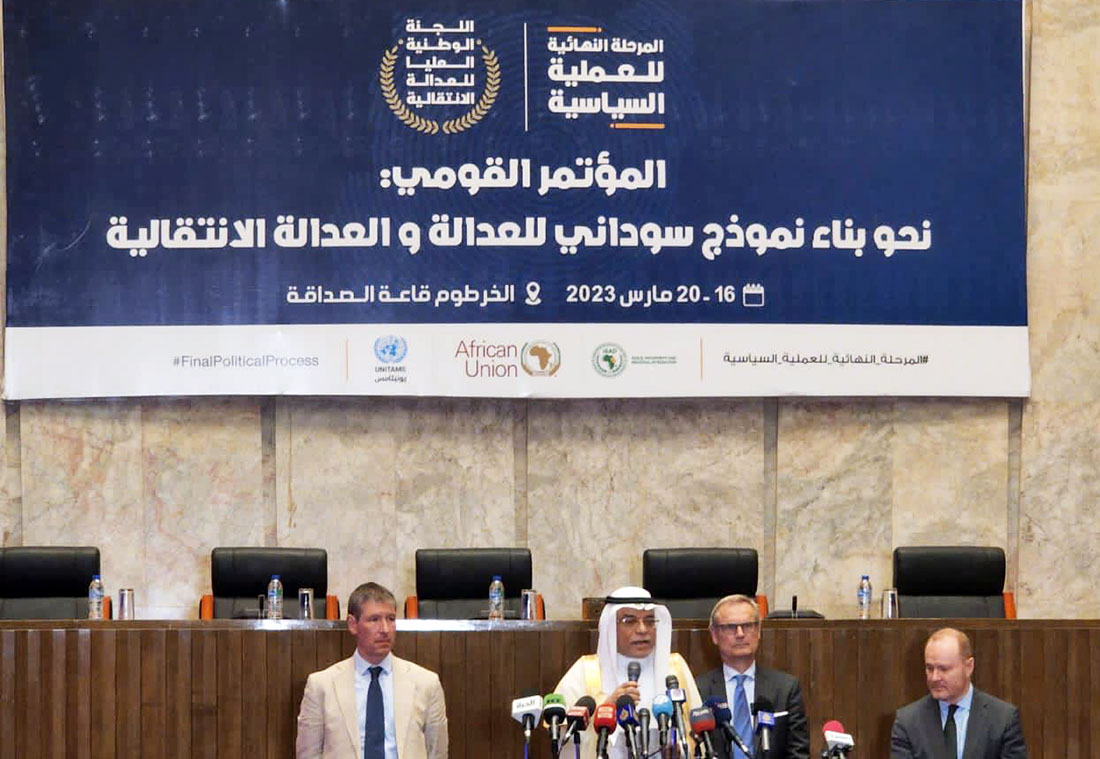
Sudans Model for Transitional Justice in the Face of the Hate State
Khaled Masa
"Transitional justice is not an application of the law... It is the application of a culture... This culture means that we have a firm conviction that our people are capable of the idea and concept of "tolerance..." So spoke the tongue of the legal righteous, the activist bridges and the late mouthpiece Kamal al-Jizuli on him the mercy of God in defining the concept of transitional justice, which we believe is the foundation of a model "Sudanese" transitional justice results from in-depth readings in other peoples experiences on the issue of transitional justice and a whole range of approaches to the different Sudanese situation in its context, bearing the experience of a diverse society in its races, religions, cultures and political experiences before and after independence, which is a different example from the experiences of the world and the region.
From March 16 to March 20, 2023, days before the April War, a national conference was held under the slogan " "Towards building a Sudanese model of transitional justice", which is one of the issues mentioned in the framework agreement signed on December 5, 2022. Its recommendations were considered one of the original parts of what was then called the political process. The war broke its way in the discussions of the security and military reform workshop.
The legacy of the past certainly burdened the Sudanese state and made the Sudanese model of grievances and bitterness the most difficult and complex model for the implementation of the transitional justice model among the models of South Africa, Kenya, Morocco and Colombia.
"Stakeholders"... Is the description chosen by the conferences at the National Conference to Build the Sudanese Model of Transitional Justice for those who have been covered by the Ombudsman since mid-1989 until the victims of the post-25 October coup d �tat, as stipulated in the Framework Agreement "The issue of justice and transitional justice is one requiring the participation of stakeholders and martyrs families and involving all those affected by human rights violations since 1989 to date" More pessimists than the political process were not told that the scale and number of casualties would be compounded by the widening cycle of violations created by the mid-April war that same year.
"No to war" appeals. It is part of the process of standing up to the society of injustices, bitterness and hatred in favour of the society of justice. It is the first step towards the "Sudanese model" of transitional justice, which requires that victims be given redress and reparation for the harm caused by the April War.
Sudans model of transitional justice must be based on the principle of truth-finding, which leads us to the real perpetrators and describes them accurately in accordance with the applicable international law and standards in war crimes in order to achieve the required redress for victims.
In the model of the Sudanese situation, we need an accurate description of what is and what is understood. "Transitional justice" specifically for stakeholders to meet this characterization campaign "Demonization" of the concept adopted by the parties to the conflict in the Sudan, which demonstrated the concept within the limits of being one of the "Truss" machinery of political settlement, which fails to achieve the inherent principles of justice and transitional justice by achieving justice for victims and blocks the path to impunity for perpetrators.
"Tolerance" is an inherent behaviour in the conscience of the Sudanese people and serves as an enhanced course for building the Sudanese model of transitional justice if perpetrators and perpetrators of violations do not then take them into their own hands, confess their crimes and lure the horses of violations back into the war now taking place.
"Perpetrators", in defining the Sudanese model of transitional justice, are not only those who have taken up arms and engaged in acts of violence and ethnic cleansing, but also those who have promoted discourse of discrimination and hatred and initiated any violation of the victims.
Sudans model of transitional justice must be informed by the nature of the diversity in the quality of the violation itself. In the Sudan, it was based on religion and ethnicity.
In the Sudanese model of transitional justice, the promotion of the concept of legal reform and the reform of State institutions is the path towards immature political practices that recycle violators and help them to escape punishment. Without redress and restoration of victims dignity, the seeds of hatred remain pervasive.
The Sudanese model of transitional justice is a new "social contract" regulating the Sudanese State, governed by an independent transitional justice commission, which is not entitled to allow impunity for amnesty or in contravention of agreed norms of international law. The transitional justice process is an ongoing process that is not time-bound or political.

